培养目标
通过严格规范的系统教育,培养面向未来国际商务活动的领导者,培养具有良好的商业道德,较强的决策和创新能力,熟知国际经济、技术的发展趋势,善于把握国内经济、技术发展的最新动态,积极参与国际竞争的优秀卓越的管理者。
项目优势
1、教学质量:通过三大制度保障教学质量
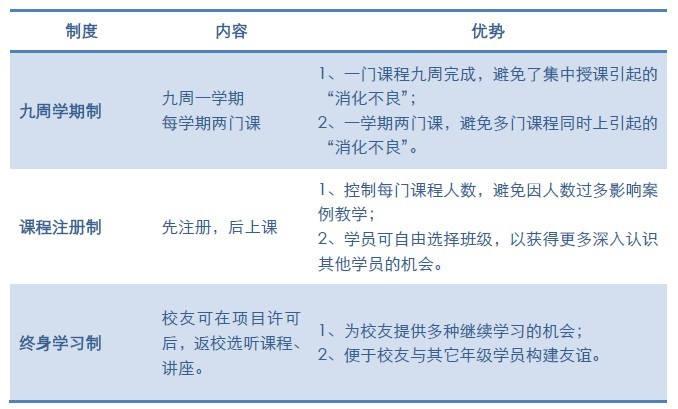
2、办学历史
是最早获中国教育部批准授予境外MBA学位项目之一
自1996年以来,已连续招生十六年
是至今为止唯一获得过国家级教学成果奖的中外合作教育项目
3、社会认可度
荣获上海市教学成果一等奖
国家优秀教学成果二等奖
学制、学习方式、学位
学制:一般为二年内(每年五个学期,每学期九周共20个月课程),最长四年
学习方式:在职学习,每周六全天上课两门
学位:经中国教育部批准授予韦伯斯特大学工商管理硕士(MBA)学位证书(可在中国教育部留学服务中心办理合作办学国外学位认证书)
韦伯斯特大学颁发的方向证书
上海财经大学颁发的结业证书
课程安排(春季班)
共16门课程 (4门预修课,10门学位核心课,2门学位选修课)
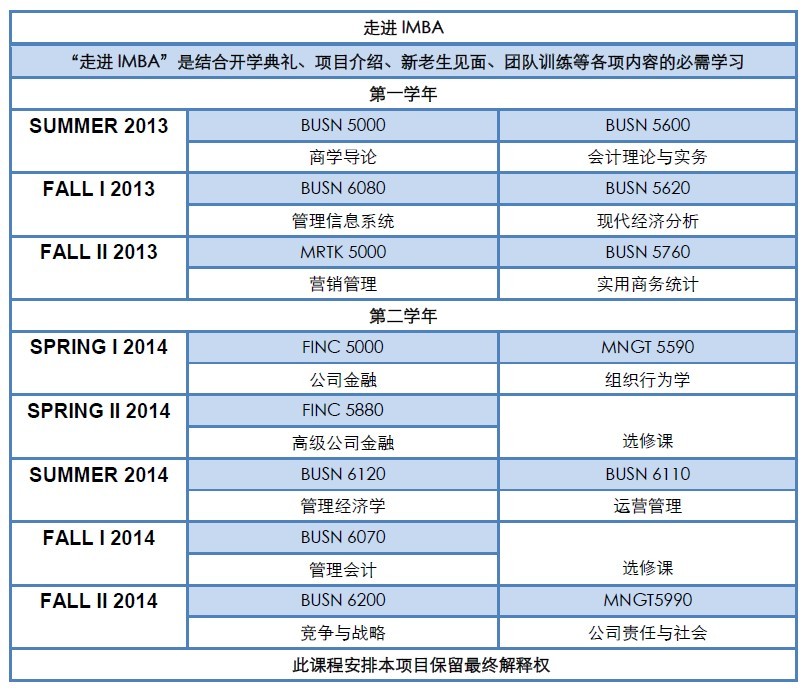
报名与录取
1、报名条件
1)具有学士学位或大学本科毕业学历
2)大专科毕业生应修满108学分
3)具有三年及以上工作经验
2、申请材料
1)手写完整的申请表
2)毕业证书和学位证书2份(中英文盖章件各2份)
3)成绩单2份(中英文盖章件各2份)
4)简历 (中英文)
5)照片3张(2寸白底)
6)身份证(复印件2张)
7)名片 (2张)
8)推荐信 (1封)
9)GMAT、托福、雅思等成绩单(如有)
3、录取程序
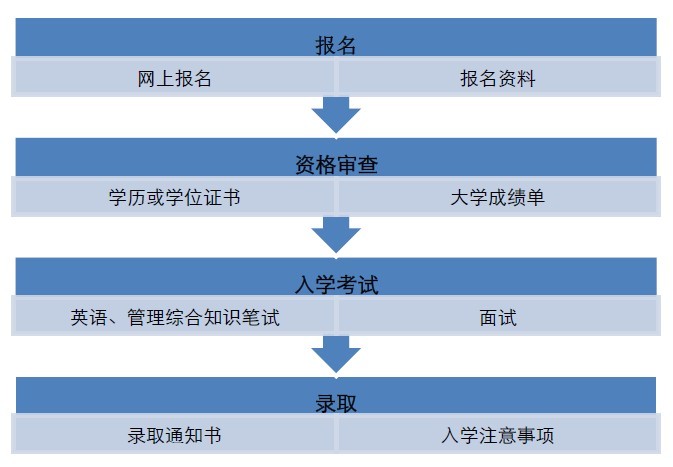
注: 符合以下条件之一者可直接进入面试环节
1、参加过2013年的MBA全国联考,英文达到国家东部线
2、全英文授课的经济管理类本科毕业生
3、GMAT考试成绩在600分以上者
符合以下条件之一者可免考英语笔试
1、TOEFL成绩(iBT)在85分以上者
2、雅思6.0分以上者
4、招生计划
上海财经大学国际MBA项目在2013年共计划招收150名学员,6月、12月两次入学

学费及报考费用
报名费:人民币500元 (入学考试前支付)
学费: 预修课-人民币8000元 (入学前支付)
学位课-人民币148000元(一半入学前支付,一半第二学年开学前支付)
东亚银行可提供无抵押贷款
报名地点
报名地点:上海市中山北一路369号上海财经大学
咨询电话:(86-21)6536 9770 13918766910
(86-21)6544 4419
电子邮箱:xi.chen@mail.shufe.edu.cn
相关网站:http://imba.shufe.edu.cn
http://www.webster.edu
新浪微博:@上财商学院IMBA
上课地点
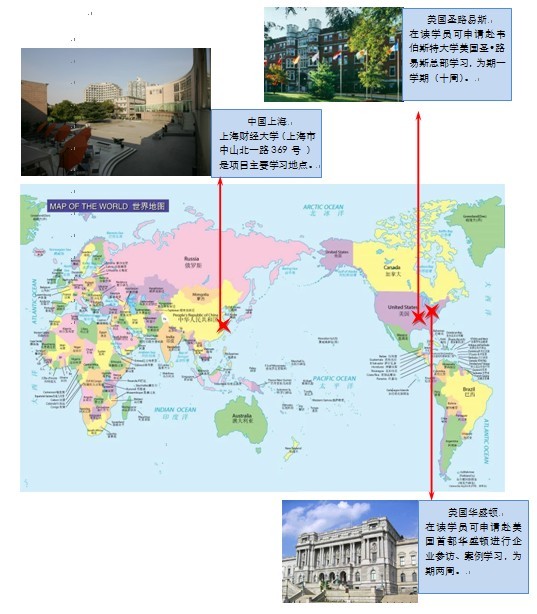
课程介绍Introduction of Courses
Four Prerequisites:
BUSN 5000 - Business
Course Description:
This course is designed to provide a foundation in theories and concepts in accounting, economics, finance, management, and marketing.
Course Objectives (Learning outcomes):
· To develop familiarity with the language and terminology of business.
· To become familiar with the basic theories, concepts, and practices of the basic functional areas of business.
· To develop an understanding of the benefits of free enterprise capitalism, as well as the dangers of unfettered capitalism.
· To develop an understanding of profit and profitability, and the important role it plays in the operation of organizations.
· To become familiar with the basic business functions and how they properly work together in an integrated way to improve organizational performance.
· To develop an understanding of the importance of international issues in modern business as well as develop an appreciation for the cultural, economic, political, and financial differences that must be taken into account if international business is to be effectively pursued.
Prerequisites:
None
BUSN5620 - Current Economic Analysis
Course Description:
Implications of current economic events are examined through the applications of economic theory. Emphasis is placed on acquainting the student with the methods of economic analysis in the context of current economic issues.
Course Objectives (Learning outcomes):
The student can utilize the Demand and Supply model to determine the impact of changes in demand or supply on price and quantity.
· The student can define GDP and describe its measurement, uses, and limitations as a measure of economic well being.
· The student can define Inflation and describe its measurement, consequences, and how to adjust for it.
· The student can explain the measurement of unemployment, its forms (i.e. structural, frictional, cyclical, and seasonal), and its shortcomings.
· The student understands how fiscal policy is used to counteract the business cycle.
· The student can describe the impact of fiscal deficits on the aggregate economy.
· The student can describe the role and tools of a central bank.
· The student understands how monetary policy is used to counteract the business cycle.
· The student can describe the arguments both for and against international trade and verbally describe the consequences of trade.
· The student can predict the effect on exchange rates of changes in relative inflation, relative income, and other macroeconomic events.
Prerequisites:
None
BUSN 5600 - Accounting Theory and Practice
Course Description:
Students examine the accounting function and its role in modern business. Basic accounting theory and principles are examined, and some of the more important contemporary accounting developments are reviewed. Problems and cases are analyzed with an emphasis on situations from the student's own work experiences. This course is designed for consumers as opposed to producers of accounting.
Course Objectives (Learning outcomes):
· Students have basic knowledge of the concepts, technical rules of generally accepted accounting principles (GAAP), and the application of these rules to the business environment.
· Students read, interpret, and analyze the primary financial statements and the annual report.
· Students read and analyze the balance sheet, the income statement and the statement of cash flows.
· Students use accounting information to make judgments about firm performance.
Prerequisites:
There are no formal prerequisites to BUSN 5600. However, it is assumed the student has appropriate graduate level writing, mathematical, and analytical skills. Also, as for all graduate courses, the student must be disciplined and self-motivated.
BUSN 6080 - Management Information Systems
Course Description:
The student examines information systems in business organizations. This course will develop the framework for an information system and explore how systems that support the business functions of the organization are integrated and aid the manager with decision making responsibilities within the operational, tactical, and strategic hierarchy of the company. Underlying the examination of various organizational information systems will be an exploration of emerging technologies that drive these systems. This course provides the student with the skills necessary to effectively understand and use information technology and shows how information technology provides organizations with a strategic competitive advantage.
Course Objectives (Learning outcomes):
This course in Business Information Systems examines technology through the eyes of the manager and is designed with the purpose of meeting several broad objectives:
· To capture the essence of contemporary computer use in business as an organizational information system.
· To emphasize current issues in computing and information technology use.
· To understand systems theory and those methodologies which provide a framework for the entire field of business computing.
· To gain a broader foundation in technology by examining the computer as a problem solving tool.
· To understand the organizational management information system and describe how the MIS concept is applied to subsets of the organization.
Prerequisites:
None
Ten Core Courses:
MRKT 5000 - Marketing Management
Course Description:
Students examine the character and importance of the marketing process, its essential functions, and the institutions exercising these functions. Course content focuses on the major policies that underlie the activities of marketing institutions and the social, economic, and political implications of such policies.
Course Objectives (Learning outcomes):
· Be able to properly identify and select markets for which specific products will be targeted.
· Explain the basic functional aspects necessary to formulate an integrated Marketing Plan. This includes Consumer Buying Behavior, Environment, Marketing Research, Product Management, Promotion, Channels of Distribution and Pricing.
· Be able to perform marketing research that is targeted towards reading of topical articles related to Marketing and being able to reference their topics to that being discussed in the class.
· Be able to develop a complete, conceptual Marketing Plan based on what is learned in this class. This objective deals with the practical application of the subject of Marketing and integrates the information presented in the entire class. This overview of a conceptual marketing plan will be used to build detailed Marketing Plans in future marketing core courses.
Prerequisites:
None
BUSN 5760 - Applied Business Statistics
Course Description:
The student examines the application of statistical analysis, hypothesis testing, and regression analysis in business decision making. The course should focus on the utilization of statistical methods as applied to business problems and operations.
Course Objectives (Learning outcomes):
· Students can describe basic statistics concepts and apply proper sampling methods.
· Students can compute basic descriptive statistics.
· Student can describe a normal distribution and apply the concepts of the normal distribution to that of sampling distributions.
· Students can construct confidence intervals for both numerical and categorical data, and can apply to a real-world business scenario.
· Students can use numerical or categorical data to assess the validity of statements made in a business setting.
· Students can perform simple and multiple regression analysis.
· Students can determine expected wealth in an uncertain business climate.
· Students can apply various advanced forecasting techniques.
Prerequisites:
None
FINC 5000 - Finance
Course Description:
The student examines the general nature of financial management, the American financial system, taxes, and the major financial decisions of corporations. Specific attention is given to present value and capital budgeting; risk and asset pricing; financial analysis and forecasting; financial decisions and market efficiency; and capital structure. Problem-solving methodology is used to illustrate the theories and tools in financial decision-making.
Course Objectives (Learning outcomes):
· Students can determine the value of fixed income securities and the value of equity securities.
· Students can discuss market functioning and the role efficient markets play in security valuation.
· Students can evaluate capital budgeting decisions using standard methodologies.
· Students can explain the impact of capital structure decisions on financial performance and the cost of capital.
· Students can identify agency problems within a corporation and formulate strategies to address them.
· Students can evaluate credit and interest rate risk.
· Students can utilize financial analysis to assess an organization’s financial condition.
Prerequisites:
BUSN5600 and BUSN 5760
FINC 5880 - Advanced Corporate Finance
Course Description:
This advanced study of corporate financial analysis and planning includes capital budgeting, cost of funds, and capital structure and valuation. Selected topics that may be covered are leasing, mergers, takeovers, business failure, reorganization, and liquidation. A combination of problem-solving and case study methodologies is used to illustrate theories and techniques helpful in financial analysis and planning.
Course Objectives (Learning outcomes):
· Students can determine the value of fixed income securities.
· Students can analyze capital budgeting decisions using standard methodologies.
· Students can explain the impact of capital structure decisions on financial performance and cost of capital.
· Students can utilize financial analysis to assess an organization’s financial condition.
· Students can construct strategies to reduce risk utilizing derivatives.
· Students demonstrate integration of more than one area of finance when using case studies.
· Students will demonstrate knowledge of lease analysis.
Prerequisites:
FINC 5000
BUSN 6120 - Managerial Economics
Course Description:
The student examines the application of microeconomic theory as applied to the managers' responsibilities within the organization. This course should emphasize the quantitative and qualitative application of economic principles to business analysis.
Course Objectives (Learning outcomes):
· Students understand how market forces affect price and quantity.
· Students understand elasticity and its relationship to pricing and revenue.
· Students can utilize statistical analysis to assess product demand conditions.
· Students can utilize industry analysis to assess market position.
Prerequisites:
BUSN 5620 and BUSN 5760
BUSN 6070 - Management Accounting
Course Description:
The student examines advanced topics in management accounting as these relate to management information needs for planning, control, and decision making. Topics include interpretation of standard cost variances; application of quantitative techniques; evaluation of divisional performance; activity-based costing; and the behavioral impact of accounting systems.
Course Objectives (Learning outcomes):
· Students have basic knowledge of important facts, terminology, concepts, principles, and theories in the area of Accounting.
· Students can address unstructured business problems that span multiple functional areas.
· Students can evaluate and analyze profitability.
· Students can calculate costs of providing a good or service.
· Students can distinguish relevant versus irrelevant costs for decision making.
· Students can make short-term or tactical decisions.
· Students can evaluate capital investment projects using NPV and IRR.
· Students can prepare operational budgets.
· Students understand how to use financial information to evaluate performance.
· Students can determine the transfer price that would maximize profits.
Prerequisites:
BUSN 5600 and BUSN 5760
BUSN 6110 - Operations and Project Management
Course Description:
This is a course that focuses on the major managerial issues in manufacturing management and the tools that can be used to manage them. Special attention will be given to project management, including PERT, critical path scheduling, and time-cost models, in operations management and other business settings. The major operations management issues are quality management and control, capacity management, plant location, layout and design, production planning and scheduling, supply chain management, and inventory management. The analytical tools covered include queuing theory, statistical quality control, linear programming, and learning curves. Where appropriate, the use of operations management techniques in service and distribution organizations will be demonstrated.
Course Objectives (Learning outcomes):
· Students understand the role of OM in the firm and how the OM function must be integrated with other functions to ensure organizational success.
· Students can utilize PERT analysis to plan, manage, and evaluate a large project.
· Students understand new product development processes.
· Students know both the SQC and non-SQC approaches to the management of quality.
· Students understand both the strategic and plant level capacity planning issues.
· Students understand the major determinants of facility location decisions and will know how to use factor rating models to assist in the decision.
· Students understand the basic issues involved in facility layout with an emphasis on assembly line-type manufacturing.
· Students understand the basic issues involved in inventory management to include MRP.
· Students understand the general process of production planning to include aggregate planning and plant scheduling.
Prerequisites:
BUSN 5760
MNGT 5590 - Organizational Behavior
Course Description:
This course introduces students to many of the basic principles of human behavior that effective managers use when managing individuals and groups in organizations. These include theories relating to individual differences in abilities and attitudes, attribution, motivation, group dynamics, power and politics, leadership, conflict resolution, organizational culture, and organizational structure and design.
Course Objectives (Learning outcomes):
Upon successful completion of this course, the student will be able to:
· Define, discuss, and recognize important terminology, facts, concepts, principles, analytic techniques, and theories taught in this organizational behavior course.
· Identify and apply appropriate terminology, facts, concepts, principles, analytic techniques, and theories from the organizational behavior course when analyzing factual situations with organizational behavior problems.
· Develop reasonable solutions to organizational behavior problems using appropriate facts, concepts, principles, analytic techniques, and theories from this organizational behavior course.
· Evaluate the quality of their proposed solutions to organizational behavior problems against appropriate criteria, including organizational constraints.
· Discuss the relevance and application of the concepts, principles, and theories used in organizational behavior to contemporary events.
· Identify and discuss the interrelationships among the concepts, principles, and theories used in the different areas of organizational behavior.
Prerequisites:
None
MNGT 5990 - Corporate Responsibility and Society
Course Description:
In this course students evaluate the role of business in society and the demands managers face in maintaining moral integrity while fulfilling their obligations as agents of organizations and firms. Special emphasis is placed on ethical issues confronted by middle managers.
Course Objectives (Learning outcomes):
Upon successful completion of this course, the student will be able to:
· Identify conflicting interests and values between organizations and their members, stakeholders and publics.
· Identify and evaluate the ethical and social claims and appeals organizations and individuals employ to justify their values and actions.
· Apply major ethical theories including utilitarianism, ethics of duty, and virtue ethics to concrete organizational and personal situations.
· Evaluate critically case studies and their own careers applying appropriately the concepts of the corporation and of corporate social responsibility (CSR).
· Recognize ethical issues confronting managers, including organizational challenges to their integrity.
Prerequisites:
None
BUSN 6200 - Strategy and Competition
Course Description:
The student examines the conceptual and practical aspects of business policies and policy decision making by utilizing all the concepts, theories, and tools that were presented in the previous courses. The student should be able to analyze and recommend a comprehensive and workable approach to the situation. The course should cover current business issues and developments.
Course Objectives (Learning outcomes):
· Students understand the important facts, terminology, concepts, principles, and theories in the area of Strategy.
· Students can conduct industry analysis to assess the relative market position of a firm or product division.
· The student will be able to use accounting and financial information to assist in their strategic analysis.
· The MBA will be able to use quantitative tools to assist in the analysis of the strategy of the firm.
· The MBA can address unstructured business problems that span multiple functional areas.
Prerequisites:
All other core MBA courses
Two Elective Courses (Can be any of two and subject to change)
FINC 5840 - International Finance
Course Description:
Course content focuses on the environment in which the international financial manager operates. Students study the risks of doing business overseas and the tools available to minimize those risks. Foreign exchange risk, political risk, working capital management, long-term investments, and financing, and accounting and control are examined within this context.
Course Objectives (Learning outcomes):
· Students appreciate the overall financial environment in which global firms operate.
· Students know the basics of the market for foreign exchange.
· Students are able to discuss international parity relationships.
· Students recognize the need to manage exposures of multinational firms.
· Students understand the motivation of firms participating in foreign direct investment.
Prerequisite:
FINC 5000
BUSN 5630 - Business Law
Course Description:
This course provides a basic understanding of the laws that relate to business, with emphasis on contracts. The course will include certain financial considerations (including venture capital transactions in China).
The course is designed to familiarize MBA students with contract law problems that arise in the course of everyday business activities. The goals are to develop a perception and appreciation of the scope, extent, and importance of the law, to provide a basic knowledge of the fundamental concepts, principles, and rules of law that apply to business transactions, and to recognize the necessity of consulting a lawyer.
Course Objectives (Learning outcomes):
· At the end of the course the student will have achieved the following:
· knowledge of basic legal terminology and practices;
· recognition of the legal consequences of management decisions;
· Understanding of how legal issues are recognized and analyzed in the current business environment.
Prerequisite:
None
MRKT 5500 - Professional Seminars: Product and Service Development
Course Description:
Help students develop understanding and skills which teams have used to create, upgrade, or refine products and services. China is a focal point for R&D, design, and manufacturing. This is not an engineering course. The examination and study will be for managers and, especially, marketing manager.
Course Objectives (Learning outcomes):
Students should be able to move forward from their experiences in MRKT 5000 and move forward to better refine product and services. They should be able to understand and apply –
· What want or need among markets
· Customer and market dissatisfaction
· What kind of product or service
· Which people in the company might be involved
· Ways to look for new product concepts
· Teams, progress, and objectives
· Methods of tailoring or creating the product
· Launches
· The environmental scan
Prerequisite:
MRKT 5000
MRKT 5940 - Promotional Management
Course Description:
Students examine the use of all available promotional vehicles to communicate to potential customers the messages that support the objectives of the marketing plan. Each of the four elements of the promotion mix is covered: advertising, publicity, sales promotion, and personal selling. Specific focus is applied to building differentiated value perceptions in the customers in relation to competitors’ products.
Course Objectives (Learning outcomes):
Upon completion of this course the student should:
· Be knowledgeable of the four types of promotional vehicles available and the integration of these in an overall promotional plan.
· Have the ability to explain consumer-buying behavior to define what the customer gets out of the purchase in terms of self-images satisfied.
· Explain the effective use of all elements of the promotional mix to build the value of the product offered in the customer’s mind.
· Explain the overall promotion process and how it works.
· Be able to develop an in depth promotion budget and have the ability to sell this to management.
· Be able to practice Promotion planning and decision making.
Prerequisite:
MRKT 5000
Program Duration and Degree
Program Duration: 2 years (5 semesters per year, and 9 weeks per semester, total 20 months), the longest is 4 year
Teaching methods: Part-time,2 courses every week
Certificate: Master of Business Administration (MBA) degree from Webster University (Recognized by China from the Chinese Ministry of Education)
Track Certificate
Certificate of Completion from Shanghai University of Finance and Economics (SUFE)
Curriculum (Spring Semester)
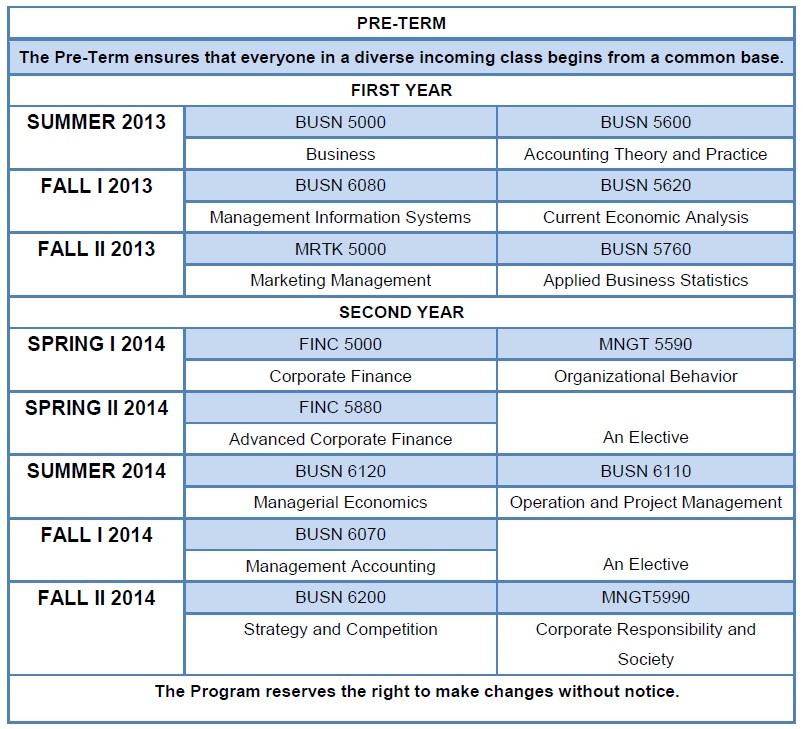
Requirements and Admission
1. Application Requirements
a) Bachelor or 4 year’s college degree
b) Or college degree but more than 108 hour of credit
c) 3 years of significant working experience
2. Application Documents
a) Written application form
b) Diploma and Bachelor degree certificate (2 copies with official seal of the issuing institute both in Chinese and English)
c) Official Transcripts (2 original ones with official seal both in Chinese and English)
d) Resume (both in Chinese and English)
e) Three photos (2”)
f) Two copies of ID card
g) Two Name Cards
h) A Recommendation Letter
i) GMAT, IELTS or TOEFL test score if available
3. Application Procedure
Remark: Meeting the following conditions can be directly into Interview process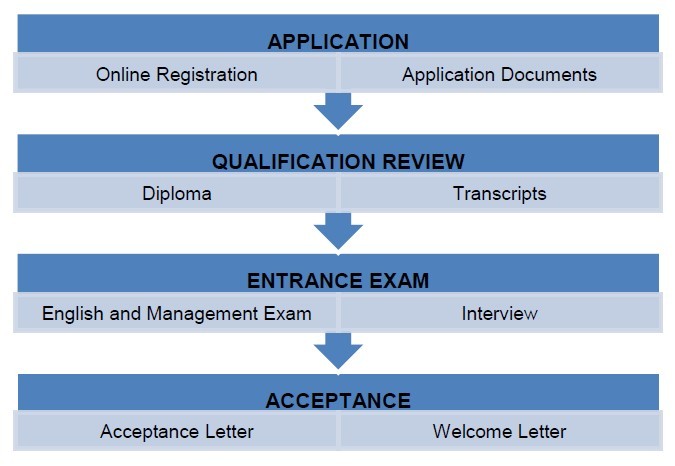

1.Attend the national entrance exam of MBA in 2013, English reach national east line
2.The graduates of taken whole English teaching economic or management courses
3.GMAT tests results are more than 600 points
Meeting the following conditions can be free of English examination
1.TOEFL score is above 85 points
2.IELTS 6.0 points above
4. Recruiting Procedure
SUFE IMBA program in the 2013 plan to take in 150 students, the time of enrollment will be in June (Spring Semester) and December (Fall Semester)

Tuition and Fee
Registration fee: RMB 500 (to be settled before entrance exam)
Prerequisite courses: RMB 8,000.00 (to be settled before opening ceremony)
Core courses and Elective Courses: RMB148,000.00 (half before class, half before second year)
Location and Information
Address: College of Business, Shanghai University of Finance & Economics
No.369 North Zhongshan No.1 Road, Shanghai, 200083, P.R.China
Tel: (86-21) 6536 9770 13918766910
(86-21) 6544 4419
E-mail: xi.chen@mail.shufe.edu.cn
Website: http://imba.shufe.edu.cn
http://www.webster.edu/
SINA Weibo: @上财商学院IMBA
